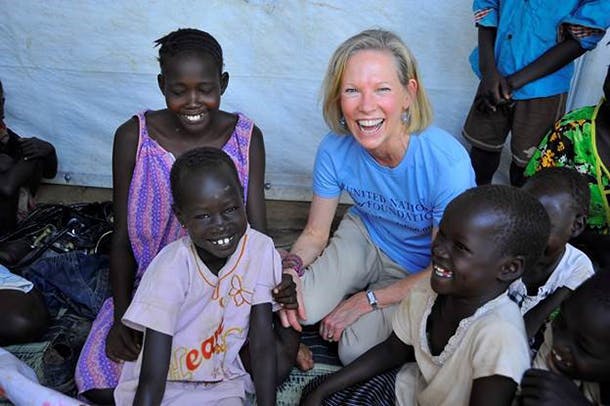
This World Refugee Day, I’m thinking about Nyanwour Deng, a mother of four whom I met at the Kakuma camp for refugees in Kenya. She and her young children fled violence in South Sudan and walked three days to get to the safety of the camp.
Around the world, the forces of conflict, climate change, environmental degradation, instability, and disrespect for human rights are leaving millions of people vulnerable and threatening to undo our gains against global poverty and other development challenges. Last year, world leaders adopted the Sustainable Development Goals and made a promise to leave no one behind. Unless we act, we will fail to reach these goals and fail the 130 million people in need of humanitarian aid.
Behind this statistic are parents like Nyanwour who want their families to be safe; children who want to go to school; men and women who had businesses, careers, and lives back home. Yet because of a horrible twist of fate beyond their control, their health, safety, and security – economic and physical – is often at risk.
For example, three in five preventable maternal deaths occur in settings of conflict, displacement, and natural disaster. So do the deaths of more than half of children under 5. And nearly one in four children living in areas of conflict are not in school.
These numbers are a stain on our global conscience. Refugees deserve a life of dignity and security like all of us.
United Nations agencies, aid organizations, and many other partners are doing life-saving work every day to help refugees, but this global challenge demands a global response. Now is the time for people from every sector and every country to come together and renew our commitment to humanity.
There are a number of steps we should take to improve and increase the global response on humanitarian challenges. We need new ideas, new partners, and new ways of working.
This includes increasing our global focus on identifying risks, preventing crises, and building resilience in communities. We also need to work better across sectors, especially the humanitarian and development sectors, to help meet the immediate and long-term needs of refugees – from food to economic opportunities. We need more reliable financing and to work more efficiently and effectively. And we need to tap into the resources and experiences of all sectors.
We have a significant opportunity to better support refugees by engaging the private sector in a fuller way. Beyond funding, businesses have expertise, products, customers, and employees that can help meet the needs of refugees in a more sustainable way. Companies like Airbnb, MasterCard, Ericsson, and LinkedIn are leveraging the inherent strengths of their brands – travel credits, pre-paid debit cards, technology, and skills matching – to help those who have lost so much.
Individuals also have an important role to play – raising awareness, telling their leaders they want action on humanitarian issues, supporting aid groups, and creating a welcoming environment for refugees.
There are a number of moments in 2016 to highlight the need to stand with refugees and enhance our collective response. The UN’s first-ever World Humanitarian Summit in May marked a turning point in our efforts with 9,000 representatives from governments, aid groups, UN agencies, businesses, and affected communities launching new initiatives and raising tough issues that need more attention. Other upcoming opportunities to accelerate momentum on humanitarian issues include World Humanitarian Day on August 19, the UN high-level meeting on refugees and migrants on September 19, and U.S. President Barack Obama’s summit on refugees on September 20.
The UN Foundation will continue to support the work of the UN and partners to address the health, needs, and rights of vulnerable families affected by conflict, disaster, and emergencies – from providing anti-malaria bed nets to refugee families in sub-Saharan Africa, to advocating for access to energy in humanitarian settings, to supporting at-risk girls and women through education, health services, and more and better gender data collection.
On World Refugee Day, we hope you will join the UN to stand #WithRefugees. Click here to learn about concrete actions you can take today.
[Photo: Alex Kamweru for UN Foundation]



 View All Blog Posts
View All Blog Posts